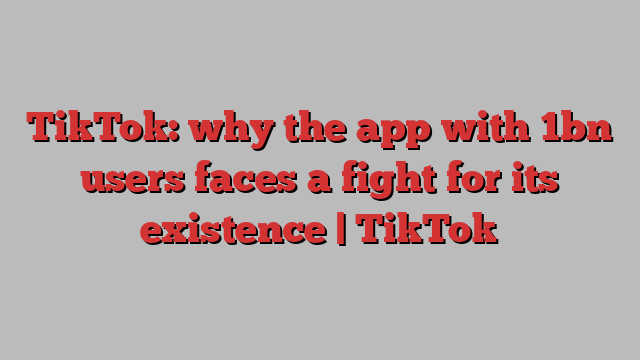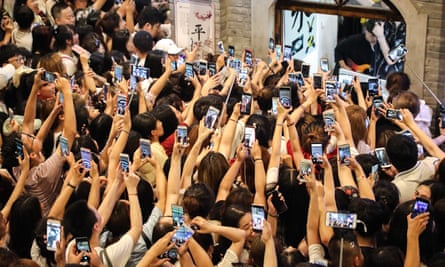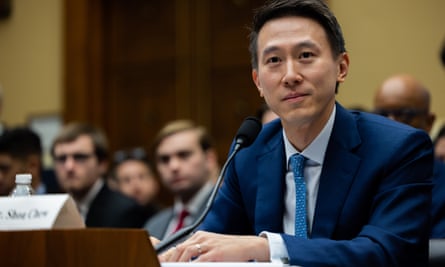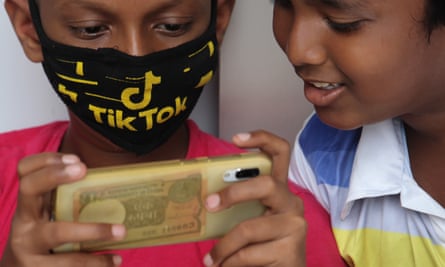
Sitting at the heart of youth culture, TikTok is beloved of its more than 1 billion users worldwide.
With a range of compelling content that extends from viral dances to comedy skits, cleaning hacks, BookTok, music and the Gen Z melancholy of the corecore trend, it is the app of the 21st century.
But in the sphere of western politics, the Chinese-owned company is increasingly friendless – caught in a geopolitical standoff between the rise of China as a superpower and mistrust of Beijing in countries where so many of the short-video app’s users are based.
As a consequence, TikTok faces a serious threat of deletion, with the US leading the charge.
Here, the Guardian’s technology editors explain how TikTok became a social media sensation – and why politicians and health experts are now gunning for it.

The phenomenon
TikTok is enormously successful, on both sides of the Atlantic. The company’s chief executive, Shou Zi Chew (whose Singaporean heritage was emphasised when he testified in front of the US Congress last week), says the app has more than 150 million monthly active users in the US alone. In the UK, Ofcom data shows that this time last year the average TikTok user (of those older than 15) spent 29 minutes a day on the app, only slightly less than the time spent on Facebook and Messenger combined. Last year TikTok had 18 million users in the UK, according to the analytics firm data.ai.
But for the company’s core demographic, aged between 15 and 24, engagement in the UK is through the roof: the average young adult TikToker spends almost an hour a day on the app. And while Instagram and YouTube have more absolute users, TikTok is catching up fast.
In the first quarter of 2022 in the UK, 73% of 15- to 24-year-olds had used the app, vastly outstripping peers such as Facebook, Twitter and Snapchat. Comparable stats for 2023 are not yet available but every indication suggests that usage has risen further. This combination of attention span and demographics makes the app very appealing to advertisers, who spent more than $10bn (£8.1bn) on the platform last year, according to industry estimates.
TikTok’s popularity is driven in part by the recommendation algorithm that drives its main feed, the “For You” page. The app seems to have an uncanny ability for working out what you like – and reels you in, hence that daily viewing time.
Marc Faddoul, a director at AI Forensics, a European non-profit that investigates algorithms, says TikTok’s key advantage is its ability to build a detailed psychological and subject interest profile of users who scroll through endless videos, leaving a trail of revealing data.
“What makes TikTok special and different to others is the rate at which it collects data from your interaction with it. If you spend an hour on TikTok, you are going to scroll through many hundreds – up to 1,000 – videos, and each view will generate data, such as length of viewing time, that allows TikTok to refine its targeting.”
He adds that the way TikTok shows one video at a time across a mobile screen means a user’s scrolling behaviour generates “precise and rapid feedback” from every video.
But that uncanny algorithm is also driving the very suspicion that could kill the app.
That suspicion was heightened in the aftermath of Chew’s appearance in front of Congress last week. The morning after, users across the world reported a flood of “pro-Chew” videos appearing on their For You pages, and shared their suspicions that TikTok was artificially promoting content that supported its stance against the bans. TikTok denies any interference and says it did not promote the Chew clips.
Others countered that the algorithm was simply reflecting the TikTok audience’s own pro-TikTok feelings. But the opacity that enables that suspicion is the same opacity that legislators worry could be weaponised by a Chinese state that has little regard for rule of law and a history of strong-arming commercial organisations into compliance.

Security fears
The security concerns around TikTok are threefold, according to Bryan Cunningham, a former White House lawyer and adviser to the US data security firm Theon Technology. They are: misuse of personal data gleaned from the app, which could be used to profile users who, for instance, work for foreign governments; using the app to infect a user’s device; and the Chinese Communist party using the app’s compelling algorithm to manipulate the For You feed and, thus, public opinion.
Cunningham, and many other TikTok critics, point to Chinese security laws that require cooperation with the state, including a 2017 national security law in China that requires organisations and citizens to “support, assist and cooperate with the state intelligence work”.
While Cunningham acknowledges that no definitive proof has been produced of Chinese state interference in TikTok, he says the concerns about the app’s data harvesting and its ownership are enough to warrant a move against it.
“We don’t know if the sabotage aspect or the data exfiltration has happened,” he says. “But my view is it’s certainly all theoretically possible. And as far as I’m concerned, as a national security lawyer that’s enough for us to take action.”
These worries have already led to a series of bans of TikTok on government-issued phones in countries including the US, Canada and the UK as well as in the EU’s executive arm, the European Commission.
The Committee on Foreign Investment in the United States, a US government body that reviews foreign investment on national security grounds, has decided TikTok’s ties to China pose an unacceptable security risk of state interference, and has ordered ByteDance, TikTok’s Beijing-based parent company, to divest itself of the app or face a ban.
If ByteDance refuses, or tries to spin off a diminished version of TikTok, then Americans could wake up one day to find their favourite app no longer exists.
after newsletter promotion
Any attempt to ban the app would be likely to prompt legal action against the US government – TikTok successfully fought off similar moves by the Trump administration in 2020.
TikTok says it is pushing ahead with a data security plan that appears to have been rejected by the US government, which involves user data being stored on third-party servers owned by the US tech firm Oracle, with that same company vetting app updates that are sent to the Apple and Android app stores. It has also announced a similar plan for the storage of European data.
However, what the US does with TikTok is influential elsewhere. Before the UK government announced a TikTok ban on official phones, the prime minister, Rishi Sunak, said: “We look at what our allies are doing.” In the US, momentum is clearly building towards further action against the app.
A TikTok spokesperson said recent government bans were “based on fundamental misconceptions and driven by wider geopolitics” in which the app played no part. “We remain committed to working with governments and partners to address any security concerns, but ask to be judged on facts, not fears, and treated equally to our competitors,” they said.
There has been no definitive proof of critics’ concerns about TikTok, but several news stories have raised doubts. In 2019, the Guardian revealed that TikTok’s moderation guidelines helped promote Beijing’s view of foreign policy, while last year BuzzFeed reported that China-based employees at ByteDance had accessed nonpublic data about US TikTok users. Then in December, TikTok’s credibility was damaged when ByteDance admitted that employees had used the app to spy on reporters.
TikTok’s privacy policy is clear that it accesses, among other things, your email address, your contacts, your direct messages, payment details and location. That is not substantially different from other social media apps such as Instagram. But other social media apps do not have to be as squeaky clean in the way that TikTok does if it is to allay fears.

Health concerns
Security is not the only issue facing TikTok – there are growing anxieties about the effect it has on users’ mental health. In some respects, they echo the concerns raised with other social media platforms, and relate to its recommendation algorithm and teen mental health.
For instance, last year an EU-backed study by academics and clinicians on young people and internet-related mental health set out some of the problems. The study interviewed a British 17-year-old girl with a history of binge-eating disorders and suicidal behaviours, who said she was able to access content teaching people how to become anorexic via typing in a hashtag.
She said users found a way to circumvent TikTok’s moderators, including putting content about eating disorders in the comment section.
“[To make sure] they don’t get taken down, the video itself, what they do is they say: ‘Look in the comments for this.’ So, it’s just music playing in the background, an empty screen and look at the comments. You open up the comments and the comments section is full of these random people giving you eating disorder tips … And it’s like sharing stuff in secret ways that I’ve realised, yes, people are really good at finding stuff like that.”
A 16-year-old British boy in the same study said his use of TikTok resembled an addiction. “It’s not that it was not fun, it was consuming a lot of my time and I really disliked it. I deleted it before, but I ended up getting it again because I got an addiction to it in a way.”
The report’s lead author, Prof Sonia Livingstone at the London School of Economics, says even well-balanced teenagers that she talks to struggle to “pull away” from the app. She adds: “Young people tell me over and again that they have a sense of compulsion to stay on the app, to see the next thing and the next thing, because the videos are short, attention grabbing and because they are popular.”
Livingstone says she has spoken to young people who try to create “coping strategies” such as “following happier hashtags to balance the flow of content they are served”. She adds that young TikTok users find it “quite scary” how their interaction with the platform is being measured.
Further research published last year suggests TikTok’s algorithm pushes self-harm and eating disorder content to teenagers within minutes of them expressing interest in the topics on the app. The Center for Countering Digital Hate, which carried out the study via a series of “fake” accounts for 13-year-olds, said the results were “every parent’s nightmare”. TikTok said the study did not reflect the experience or viewing habits of real-life users of the app.
A TikTok spokesperson said the company aimed to make the app “a place where people can share their true selves, raise awareness for important causes and find community”. Indeed, the EU-backed mental health report flags how TikTok can help people in recovery from eating disorders. The company also announced this month that teenagers joining TikTok would be limited to an hour of use each day, although the restriction can be altered or removed entirely in the app’s settings.
TikTok is also far from the first social media app to be subject to concerns about mental health. Mark Zuckerberg’s Meta was accused by the whisteblower Frances Haugen in 2021 of failing to address internal research showing the negative impact of its Instagram platform on teen mental health.
That may be the paradox at the heart of TikTok. From its aggressive data collection, to fears it is harming the mental wellbeing of its young users, and even the central importance of the app on youth culture around the world, the app can sometimes feel as American as it comes. But in the only way that matters, it is not – and that could be an unsurmountable hurdle.